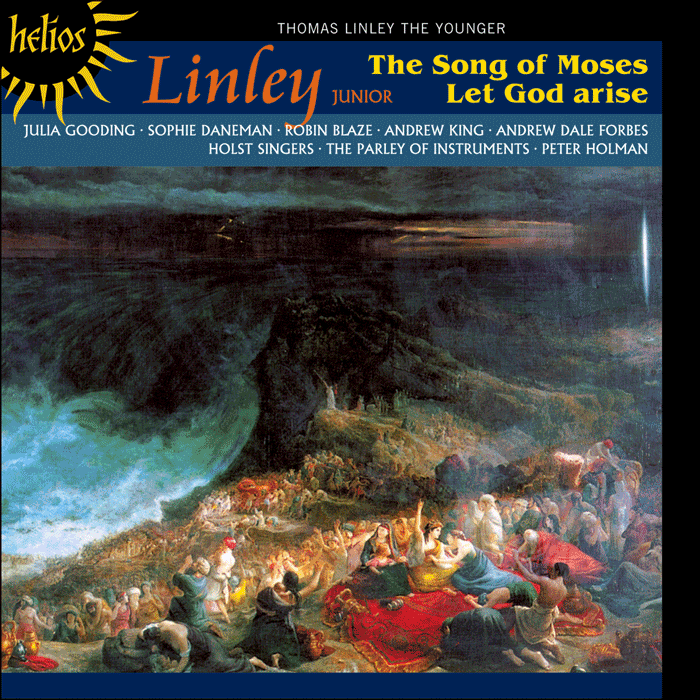Logowanie
Dziś nikt już tak genialnie nie jazzuje!
Bobby Hutcherson, Joe Sample
San Francisco
SHM-CD/SACD - NOWY FORMAT - DŻWIĘK TAK CZYSTY, JAK Z CZASU WIELKIEGO WYBUCHU!
Wayne Shorter, Freddie Hubbard, Herbie Hancock, Ron Carter, Elvin Jones
Speak no evil
UHQCD - dotknij Oryginału - MQA (Master Quality Authenticated)
Chesky! Niezmiennie perfekcyjny
Winylowy niezbędnik
ClearAudio
Double Matrix Professional - Sonic
najbardziej inteligentna i skuteczna pralka do płyt winylowych wszelkiego typu - całkowicie automatyczna
LINLEY, The Parley of Instruments, Peter Holman
The Song of Moses and Let God arise
- The Song of Moses
- 1 No 01. Chorus: Praise be to God, and God alone [4:28]
- Andrew Peter King (tenor), Andrew Dale Forbes (bass), Holst Singers
- 2 No 02. Duet: Jehovah ever be my song [4:28]
- Julia Gooding (soprano), Sophie Daneman (soprano)
- 3 No 03. Accompanied recitative: No force can stand [0:22]
- Sophie Daneman (soprano)
- 4 No 04. Air – Chorus: O Israel turn – The wave hath closed [6:39]
- Sophie Daneman (soprano), Holst Singers
- 5 No 05. Air: Thy arm, O Lord of Hosts [3:20]
- Julia Gooding (soprano)
- 6 No 06. Recitative: Lo, the waves thy breath obey [0:35]
- Sophie Daneman (soprano)
- 7 No 07. Chorus: The sea is before them [3:17]
- Holst Singers
- 8 No 08. Accompanied recitative: Thus the foe with haughty pride [1:36]
- Sophie Daneman (soprano)
- 9 No 09. Air: 'Mong the Gods by men adored [2:44]
- Andrew Dale Forbes (bass)
- 10 No 10. Accompanied recitative: Thou stretchest out thy hand [1:21]
- Julia Gooding (soprano)
- 11 No 11. Air: Thou, as thy mercy had decreed [3:28]
- Julia Gooding (soprano)
- 12 No 12. Recitative: Thither, what power [0:29]
- Sophie Daneman (soprano)
- 13 No 13. Chorus: All Canaan's heathen race [3:01]
- Holst Singers
- 14 No 14. Duet: Thither thy people, Lord [5:08]
- Julia Gooding (soprano), Sophie Daneman (soprano)
- 15 No 15. Chorus: To ages shalt thou stretch thy sway [2:59]
- Holst Singers
- Let God arise
- 16 No 1. Overture: [Andante] – Allegro [3:28]
- 17 No 2. Chorus: Let God arise [2:38]
- Holst Singers
- 18 No 3. Air: But let the righteous be glad [2:47]
- Andrew Peter King (tenor)
- 19 No 4. Chorus: O sing unto God [1:42]
- Holst Singers
- 20 No 5. Chorus: Magnify him [2:49]
- Robin Blaze (countertenor), Andrew Peter King (tenor), Holst Singers
- 21 No 6. Duet: He is a father [3:10]
- Julia Gooding (soprano), Sophie Daneman (soprano)
- 22 No 7. Air: Give thanks, O Israel [1:57]
- Andrew Dale Forbes (bass)
- 23 No 8. Chorus: Wonderful art thou [3:32]
- The Parley of Instruments - orchestra
- Peter Holman - conductor
- LINLEY
GRAMOPHONE CRITICS' CHOICE 'Another indispensable release in the English Orpheus series. The adventurous will find their curiosity amply rewarded' (Classic CD) 'One of the best finds yet in Hyperion's English Orpheus series' (Gramophone) 'Linley might well have been an English answer to Mozart, as this fine short oratorio shows' (Daily Mail) ------------------------------- Thomas Linley was born in Bath into a highly musical family. Had he not died tragically young in a boating accident it seems likely that he would have won for himself a far greater name. He travelled widely, was a friend of Mozart (who commented that 'had he lived, he would have been one of the greatest ornaments of the musical world'), and was widely mourned. The Song of Moses was one of his last works. A grand oratorio in Handelian style, it contains a varied range of arias alongside choruses which are at once expertly written and intensely dramatic (something here developed to the full by the Holst Singers). The story is taken from Exodus (Chapter 15) and concentrates on the Israelites' rejoicing after the Red Sea was closed over the pursuing Egyptian forces—much the same as Handel's Israel in Egypt. This recording is the work's first performance since 1778. Let God arise is an earlier work, one of his first surviving compositions of any size, and is a large-scale anthem after the style of Handel or Boyce. Again the choruses have real strength and contrapuntal power, and the arias show a skill rare in one so young.


































